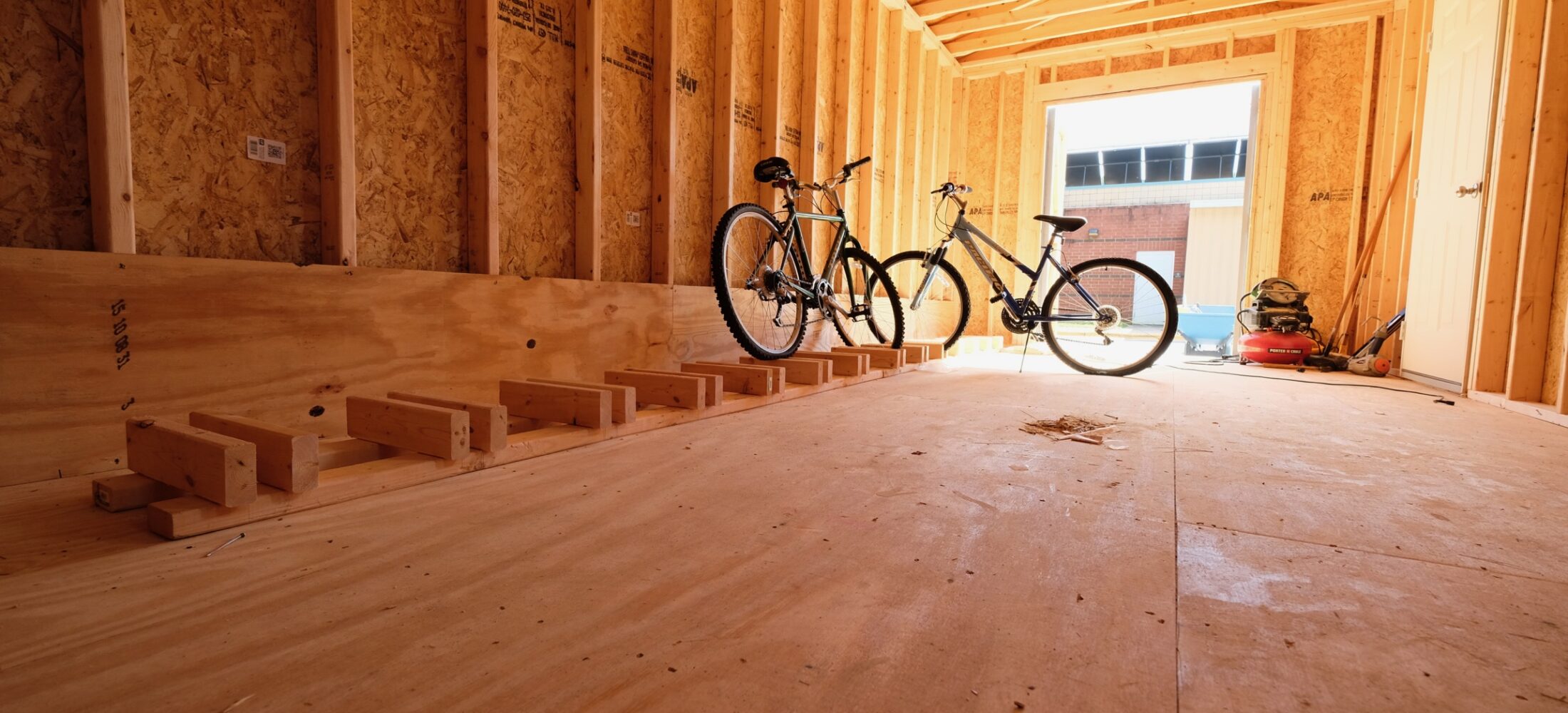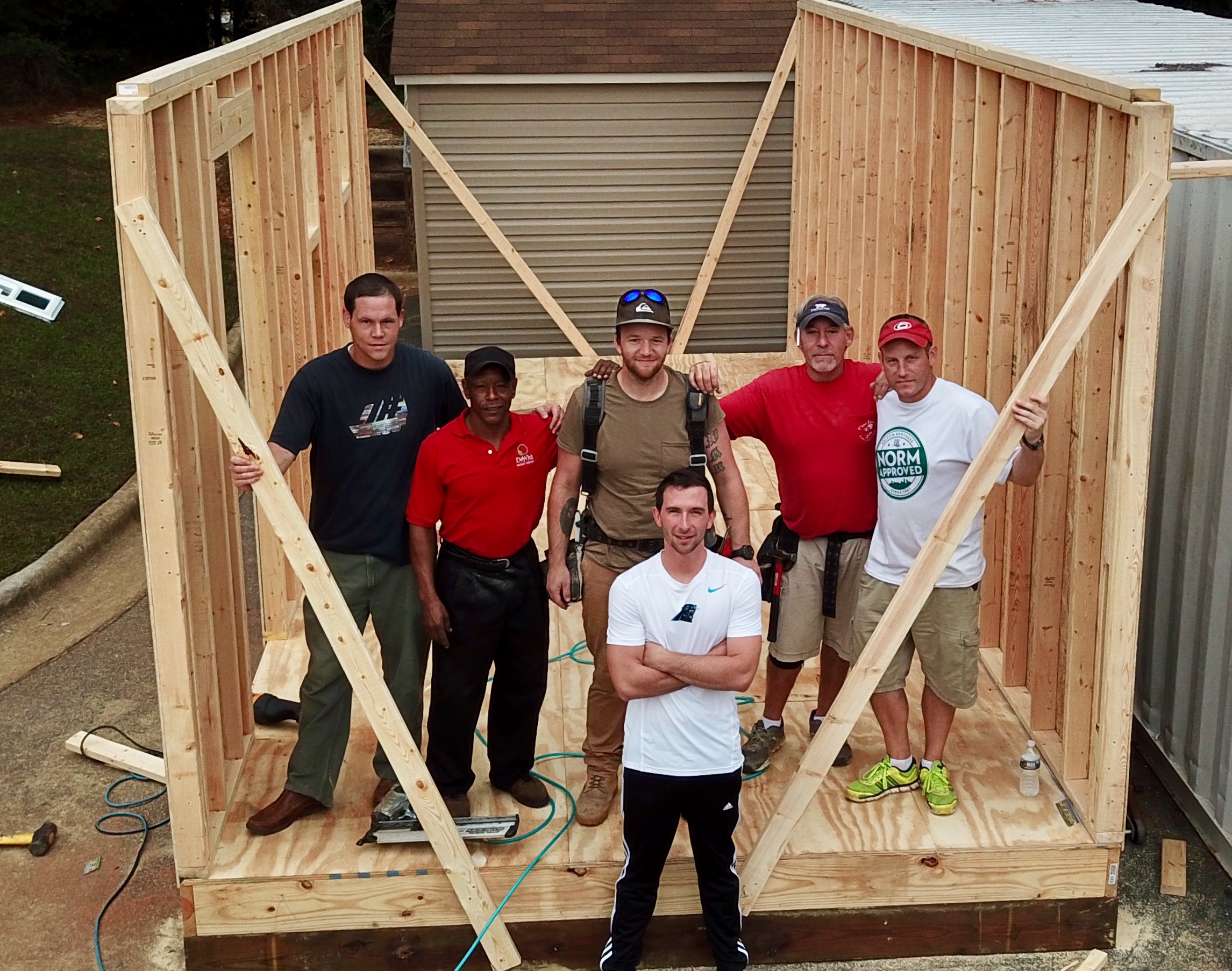
Setting Up Shop
What was the inspiration behind the bike shelter project?
Healing Transitions has had bicycles the men could use for exercise, going to mutual aid 12-step meetings and getting to jobs for years. These bikes offered a great form of transportation, however, they were locked to an outside bike rack which caused them to rust and break down due to the environmental elements. The bike shelter was envisioned by a program participant who wanted to ride one of these bikes but was unable to find a safe one that functioned. We contemplated just fixing these broken down bikes or purchasing new ones but it occurred to us that if we did so they would eventually become rusted and tattered again sitting outside. So we decided to build a bike shelter that could not only store bikes but also offer repair shop that could fix any bikes that broke down.
How many folks worked on the project and how did you get them involved?
We had quite a few participants working on this project from various phases of the HT program. Lamar, the person that envisioned the project, had been involved as a participant for around 6 months at the time of the project’s inception. Currently, Lamar has a great job, is over a year sober and is nearing his a transition to a sober living house. Matt and Blake did separate commitments as Bike Shelter project managers. All participants give back to Healing Transitions towards the end of the program with a commitment to a certain HT element—some serve as Chef’s assistants while others work on specialized roles with our Building and Grounds crew. Both Matt and Blake had been involved with the program about a year when they completed their commitments with the bike shelter. The have both since graduated from the program and are currently thriving in sobriety. The project foremen consisted of a couple of master carpenters who had been in the program a little over 8 months. They drew up plans for the shelter, estimated expenses and directed other program participants on building the structure. Three other carpenters who were also program participants ranging in length of program stay from three to seven months helped construct the sturdy shelter. As a silver chipper (a Healing Transitions program graduate) and staff member my main responsibility was signing off on what the men needed which made job pretty simple. This project was special because these men, who are living in a homeless shelter, saw a problem, formed a plan, created blue prints, estimated material costs, managed construction and produced a well-built shelter that provides current and future program participants safe working bikes to aid them on their recovery journey. The men, who had been in construction the majority of their professional lives, were doing what they loved to do and making a positive impact on the organization that was helping them achieve and sustain the productive lifestyle of recovery.
The Raleigh Community also had a major impact on the construction and maintenance of the shelter. Runologie donated proceeds from their 2017 Keep RLGH Independent Four Miler to provide project funding and sustainability for the shelter. Lowes of Garner donated all of the material for construction and sent a volunteer crew to help paint the shelter after it was constructed. Oak City Cycling donated bikes and gear while also providing knowledge about bicycle repair. The City of Oaks Foundation donated helmets to keep the guys safe and the City of Raleigh donated both front and tail lights to ensure the men were visible while riding. And, David, at Recyclery (awesome bike repair shop/non-profit in Chapel Hill) ambassador, helped us set the shelter up to become a sustainable repair workshop, he also provided much needed bicycle repair tools at no expense to the HT. We certainly could not have built the shelter without the help of the local community and are exceedingly grateful for their commitment to making the project a reality.
How long did it take to build? Any hiccups along the way?
It took a little over two weeks to construct, and was painted in one day. However, managing the location and planning of the project took a little more time. We had to figure out where we could locate the shelter as to not infringe on any City zoning regulations which proved trickier than we, at first, imagined. However, after some trial and error we found a suitable location. We actually used a bunch of men in the program to move another shed to make room for this one to be constructed. Though there were a couple hiccups, the project managers and foremen handled the issues with ease—much of recovery is smoothly managing the stressors of life.
When we spoke we talked a little bit about how projects like this are more than just a bike shelter, there’s a process to building it, but then there’s the long term. How does a bike shelter help the folks in Healing Transitions in that regard?
Having men from all parts of the program come together along with the community to construct a tangible building that keeps individuals experiencing homelessness riding bikes is incredible. When building the structure the men were happy and glad to be using the skills they had honed after years of working in the construction field: they were enjoying the pleasures of sobriety. The empowering project brought the men closer together and allowed them to identify themselves as something other than a homeless, substance abusers granting them the sense of normalcy they longed for, and deserved, while staying at the HT. Stigma and labels often keep many people in active addiction and a project such as this was able to promote the individuality of each person—the bike shelter construction illuminated that people are more than their disease.
Now the men have safe bikes to ride. They are taking these bikes to 12-step meetings, to their jobs and to exercise. Transportation is often something I take for granted because I can get and my car and drive to where I need to go but these men do not have that luxury and a bicycle offers a way to sustain relationships in recovery and stay productive.
The participants developed a regulated check-out system that ensures people are held accountable for the bikes they ride— if a bike is brought back in the less than the stellar condition it was checked out in, the person will be given various actions to be completed and words to be written in order to grow from the mistake.
One participant works as the bicycle repair man fixing any donated bikes and ensuring the ones checked out are in proper working order. This process has taught him bike repair skills that he can now use if his daughter’s bike breaks down.
People that graduate the program, Silverchip, and need a bike will be rewarded one for their commitment to the year-long, residential program. This ensures they can get to their job and get back to Healing Transitions to share their experience, strength and hope with those newly arriving to the organization.
The project created connection and granted a new sense of freedom for those who helped with construction and for those who are riding the bikes.
Any other projects for Healing Transitions upcoming? Ways for folks to get involved?
If you are interested in what Healing Transitions is or how the program helps someone who has lost everything because of a substance use disorder, go from homeless to graduating the program with a job, money saved in the bank and a sober living house at no charge to the participant please join us for our community cook outs. We have one at our Women’s campus May 8th from 11 AM to 1 PM and one at our Men’s campus on June 1st from 11 AM to 1 PM. Knowledge is power and the more people that know of our mission the more people we are able to serve. Please come check us out!
In addition the Oak City Recovery Run Club celebrates their 1 year anniversary next Tuesday at Healing Transitions @ 6PM with a preview of the Runologie Raleigh Beach 5K. Full event details can be found here.

